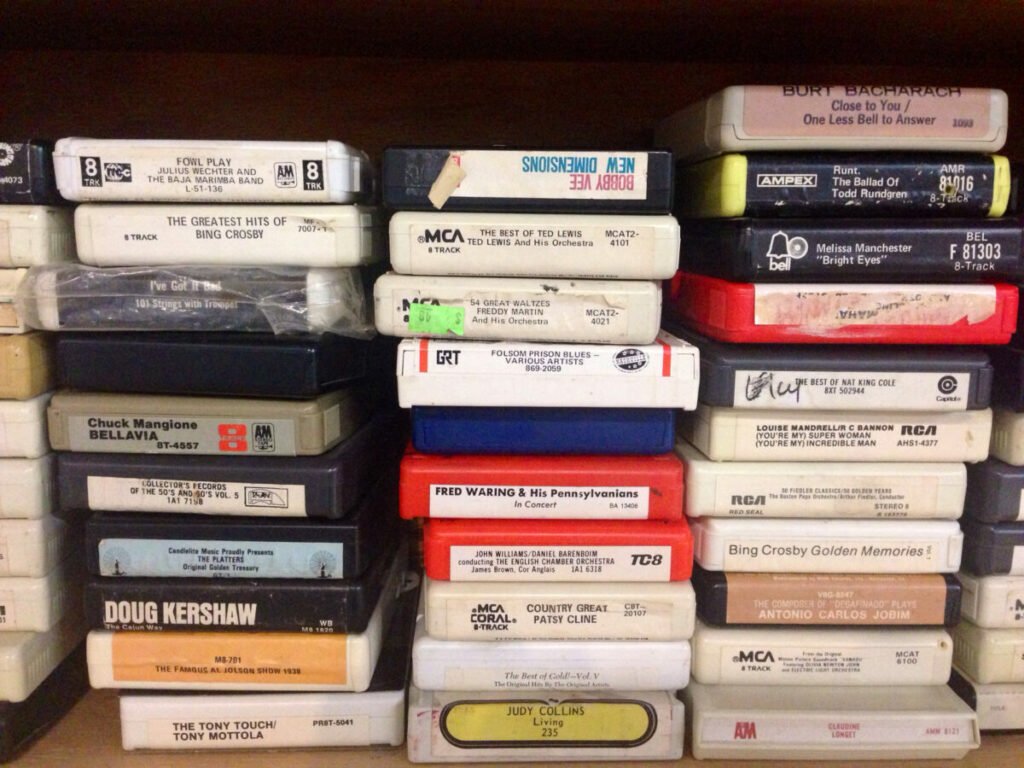Today, we stream any song we can find, google obscure one-hit wonders, and watch anyone make their own music videos on TikTok, but back before they were delegated as punch lines to jokes about music history, we loved our 8-track tapes.
The 8-track tape, a magnetic tape sound recording device enclosed in a plastic container, was popular from the late 1960s until the early 1980s. Although the quality of the sound was problematic, the protective casing was rather sturdy. Plus, 8-track tapes had the added bonus of continuous play, unlike their counterpart, the cassette, that had to be flipped over in its player in in order to hear the whole soundtrack.
When I was a child growing up in rural Pennsylvania, 8-track tapes ruled my world. Eight-track players were part of the stereos in our home, including the one that my mother kept in the kitchen. All of my family members also had these players in their vehicles, the devices mounted neatly between the dash and the center console.
I learned to love music because of 8-track tapes. My family listened to country music, so by the time I was eight, I knew the lyrics of every John Denver, Johnny Cash, Eddie Rabbitt, and Alabama song. One of my favorite past times was traveling with my father in his Ford truck, music blaring from the player while I sang “Take Me Home, Country Roads” at the top of my lungs. True, as a child, I wasn’t quite sure where West Virginia actually was, but Denver’s lyrics reminded me of the backroads of my world.
On Sunday mornings, when we didn’t go to church, my mother would improvise church hymns by playing Jim Reeves, a country singer who was also known for his Gospel music. Even now, I can hear her humming while washing dishes in the kitchen sink while listening to such songs as “In the Garden” and “Take My Hand, Precious Lord.”
But I grew tired of both the country and gospel music that dominated my home. It was 1980 and I was eight. I wanted to listen to the music of the teenagers in my life, and I was addicted to Solid Gold, a weekly music television show that highlighted the top hits of the week. I talked my mother into buying a few 8-track tapes of pop rock. I adored the Solid Gold Dancers, and when no one was looking I retreated to the bedroom I shared with my older sister and danced. Sure, I knew that my mini bell bottom pants made me trip with every move and that terrycloth halters were nothing like the tight sparkly tops of the dancers, but I still imitated their moves. I twirled and ducked and swung my non-existent hips, swaying to every beat and note.
An image of a scrawny child, all elbows, scraped knees and sharp hips, trying to dance may make me smile now, but when I remember this period in my life, I think of how the music blasting from these 8-track tapes was a source of refuge. It was a time when money troubles plagued my family and really the entire small town where I lived. The local factories were laying off workers and even those whose jobs were spared suffered cuts in pay and benefits. In my neighborhood and in my friends’ homes, I saw stay-at-home mothers and teenage family members find part-time jobs to pay the bills.
My mother was bitter. My father was angry. Their words sliced through our house cutting the air, and the quick, dead silent places between songs.
When their tones started low, my sister and I knew it was time to turn up the music. This way, we could drown out their fights.
It worked. Almost.
But we could still hear their tense voices and strained words, their arguments peppered with words: money, bills, insurance.
I don’t remember exactly when my family started listening to cassettes instead of 8-track tapes, just like I don’t remember when the fighting in our home faded. It couldn’t have been that my parents suddenly had more money. Perhaps they grew resigned. Perhaps my already thrifty mother grew thriftier.
But I do remember helping my brother take his cassette tapes apart when the music frayed. With a type of surgical precision, he used a pencil to roll over and straighten the thin tape that sometimes crinkled and warped inside his cassette player.
We never had to do that with our 8-track tapes I thought. Why did we stop buying them? Why did we trade them in for something that did not seem to work as well? Why was something so fragile supposed to be better?
We held our breath every time a fixed cassette was slipped into place and we hit the play button, just like we held our breath every time money was brought up in our home, hoping that nothing would go wrong.


Share this post with your friends.

